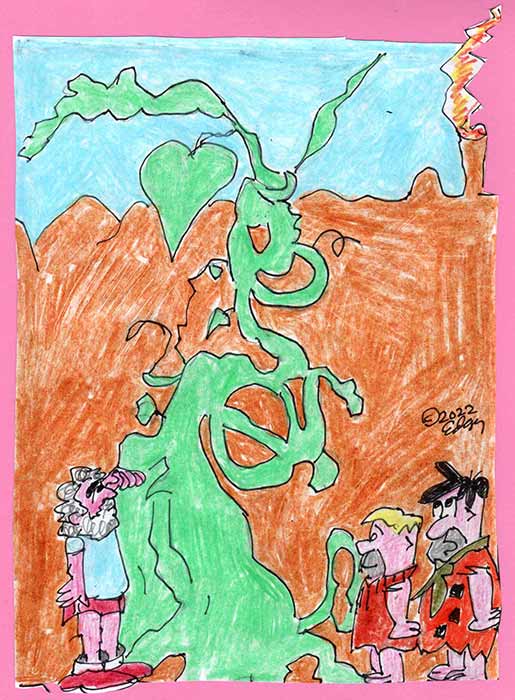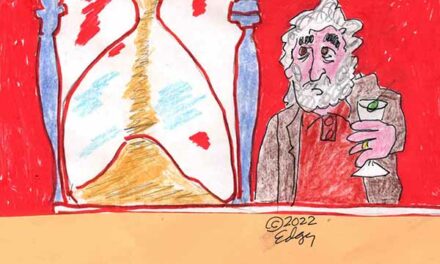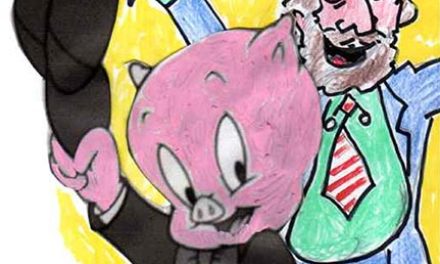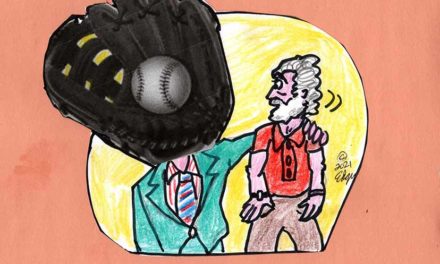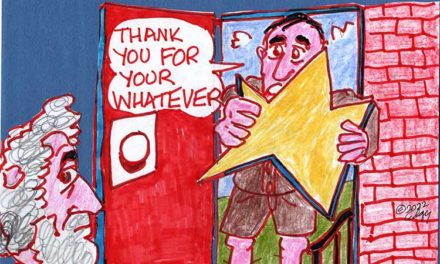Chickpeas Of The Gods—Or, Experiment In Error
This column tips its hat to agriculture
By Ed Goldman
New data suggest (to me, at least) that extraterrestrials traveled to our planet eons ago. And why? To grow garbanzo beans, of course, you puny earthling.
I like to think the aliens got here on those “Chariots of the Gods” postulated by the esteemed Swiss non-scientist Erich von Däniken in his best-selling book of that name. The book, it should be noted, included a question mark after its title. That may give you some idea of how seriously the publisher and its marketing team took the author’s essential premise—which was, to deploy an oxymoron, pure baloney.
The Preglutenous Era
I mean, publishers didn’t subtly disclaim Stephen Hawking’s magnum opus by retitling it, “A Brief History of Time?” They didn’t call Charles Darwin’s seminal work, “On the Origin of Species?” They didn’t call the late great Oliver Sacks’s 1985 book, “The Man Who Mistook His Wife for a Hat and Other Clinical Tales?”
If you’re joining us in mid-snark, von Däniken theorized that outer-space astronauts landed on earth, say, 10,000 years ago and created the species Homo sapiens.
Even while being convicted of fraud by a Swiss court—for his slippery practices as a hotel manager there, not for his clinically insane ideas—von Däniken continued to churn out more “speculative” books. Yet their titles no longer contained question marks. Coincidence? You be the judge.
Since von Däniken is now in his late 80s (or… is he?), I’ve decided to pick up the torch he dropped while rounding the last lap of the Looney Tune Olympics and write my own speculative work, suggested by a recent article in the New York Times Science Tuesday section. What follows is the proposed blurb for the front and back of the book cover:
“In his new book, ‘Hummus of the Gods?’—hotly anticipated by a list of creditors long enough to make endless-loop circles around the sun— speculative scientist Edward von Goldmänkin poignantly queries, ‘Who planted chickpea plants beneath Jericho in the West Bank, like, 10,000 years ago? ‘eh?!’
“Von Goldmänkin further wonders aloud—in the book’s audio version, of course, since it’s ‘aloud’—’How can a chickpea and garbanzo bean be the same thing, since they’re spelled and pronounced so differently? And why, when you mash them up, do they become still another name, Hummus?—Hey, are you still listening? Did you fall asleep again? Stop the recording. Sheesh.'”
Reality break: according to the Times, “(R)esearchers believe that after chickpeas were first domesticated in Turkey’s southeastern Anatolia region, their cultivation may have stagnated for millenniums, resulting in a genetic bottleneck that makes all chickpeas today descendants of a relatively small group from a thousand years ago.”
Back to the book blurb:
“In his new book, Goldmänkin addresses the so-called domestication of chickpeas, pondering what chickpeas might have been like in their previously feral state. Did the wild garbanzo beans throw parties with wheat and barley plants (which allegedly were evolving at about the same time)? And did the chickpeas’ antic behavior … go against the grain?'”
Since the book is generating a good deal of buzz, it’s not surprising that Hollywood agents have already been leaving me voicemails (one example: “How did you get this number?”). I imagine I’ll also be contacted shortly by UFO devotees as well as anti-gluten activists. In fact, to prep for the anticipated fad, I’ve already started two sequels: “Barley to Bed, Barely to Rise” and a Biblical parable, “Yeast of Eden.” Bring it awn!
Dear Readers: I make my annual pilgrimage to PBS's "Studio Sacramento" this week. Watch me if the Ambien isn't kicking in:
Ed Goldman's column appears almost every Monday, Wednesday and Friday. A former daily columnist for the Sacramento Business Journal, as well as monthly columnist for Sacramento Magazine and Comstock’s Business Magazine, he’s the author of five books, two plays and one musical (so far).
Yes, Virginia
A Weekly Blog by Virginia Varela
President and CEO, Golden Pacific Bank
photo by Phoebe Verkouw
Mr. El-Erian is a global economist, with internationally recognized expertise on international economics and financial topics. Hearing his comments on our current level of 7% inflation, 10 million in job vacancies, increasing social economic inequalities, and the important role of Central Banks was truly a special educational opportunity.
It was also a bit unnerving and scary—because he spoke the truth from a place of knowledge.
I’m concerned about the increasing uncertainty of goods when we open our wallets, and the social inequalities in front us every time we go to the local supermarket or buy gas.
I’ve always been fascinated by economics as a study of people and their behaviors. As a former banking supervisor who served at the Federal Reserve and Treasury Departments, to me, the difference between a job and a career one chooses is being truly interested in learning and expanding your knowledge and experience.
I’ve noted that in the past few years the topic of economics trends, while perhaps thinly disguised and framed as something different, is creeping into our everyday conversations—something that we all observe and talk about, while we may not label it as such.
You really should read Mr. El-Erian’s New York Times bestselling book, “When Markets Collide” and the more recent book “The Only Game in Town: Central Banks, Instability, and Avoiding the Next Collapse.” More information based on facts can only help frame our understanding of how we view our government and what we should be insisting on from our Central Bank government officials.
In these turbulent and unprecedented times, everyone should be interested in some understanding of our global financial system works, the serious trouble we may be in—and most important of all, what to do about it.
sponsored content



